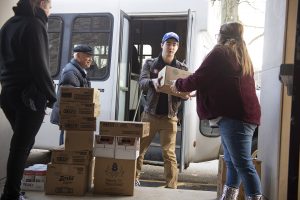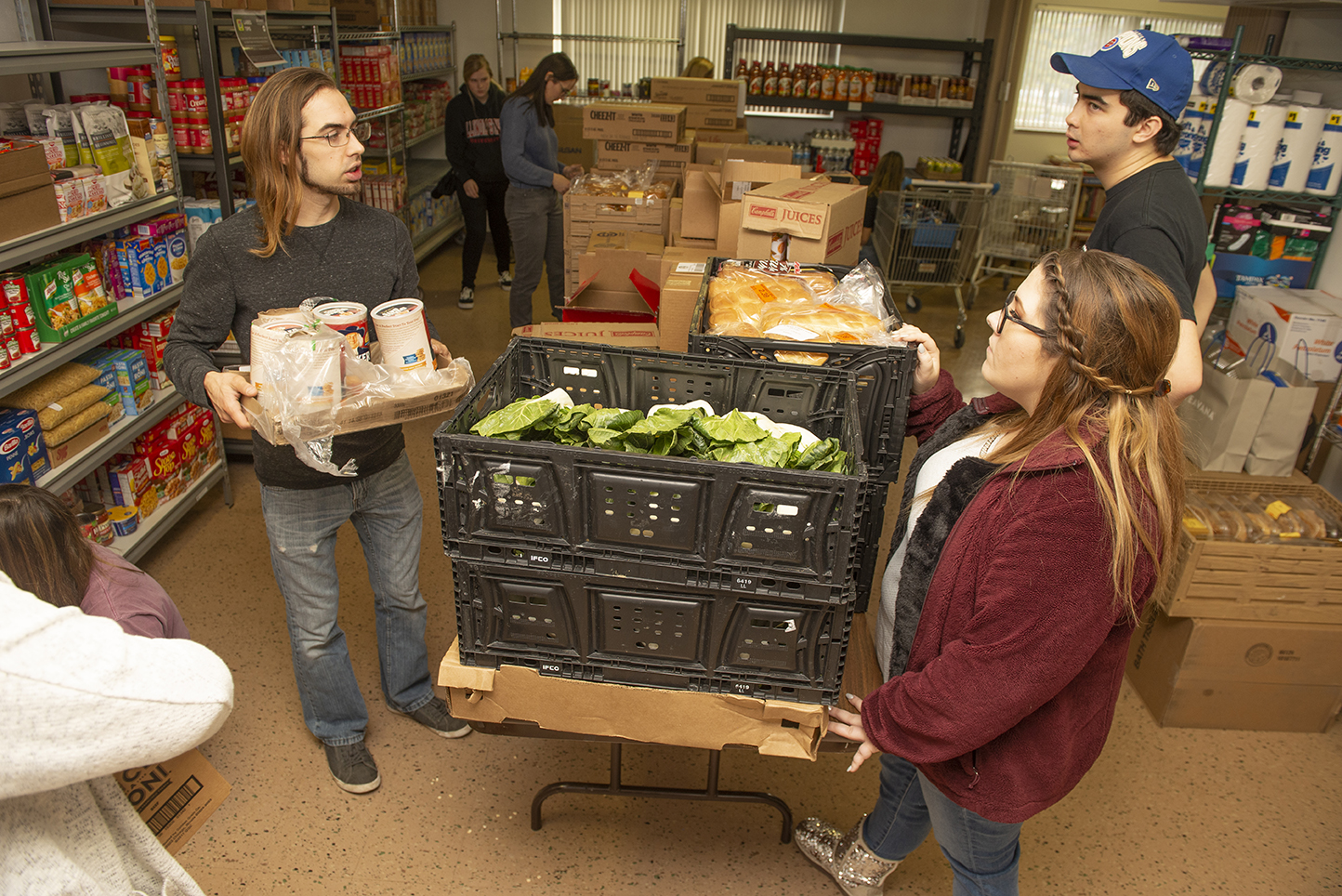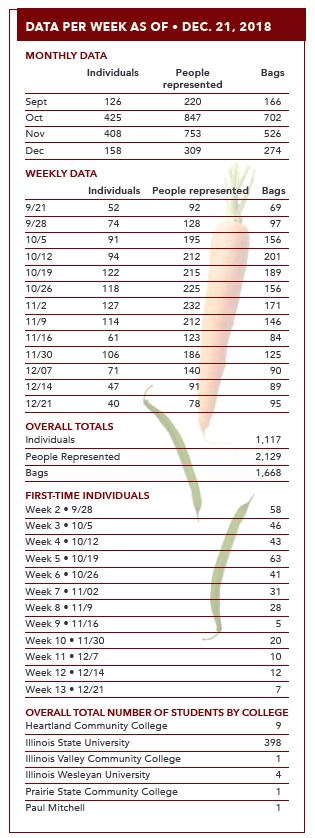When listing the struggles facing college students, people tend to think of homesickness or studying stress—many never consider hunger.
Food insecurity—or not knowing from where the next meal is coming—is at the heart of the establishment of a food pantry for Illinois State University students. The School Street Food Pantry opened last September at the First United Methodist Church in Normal.
Driven by a group of passionate students from across campus, the launching of the food pantry is a collaborative effort more than a year in the making from Illinois State students and community organizations.
“Nationally, 45 percent of college students in the United States face some uncertainty when it comes to food,” said Jeanna Campbell, a second-year graduate student in the School of Social Work. “Those numbers were even higher when we looked at Illinois State.”
Campbell, a native of Bloomington, was studying the idea of food insecurity when she came across several other groups on campus examining the same issue. Student surveys done by the Student Government Association (SGA), students in the School of Social Work, and the Department of History, and student Amy Illovsky of the Department of Family and Consumer Sciences showed the issue was a growing one. “Nearly 66 percent of students surveyed said they knew someone who has struggles obtaining food,” said Campbell.
Campbell went beyond the research to begin pulling together those interested in tackling the problem.
“We’ve always had people who are passionate about a food pantry, but just did not have the right set of circumstance to pull it off,” said Jack Whitsitt, a senior from Alexis and vice president of SGA. As senators, Whitsitt and senior in political science Jason Hale were part of the 2017 SGA food survey. “Students said that they are having to make the choice of paying for rent instead of buying food. We saw a real need for a food pantry for students,” said Whitsitt.
The SGA attempted to launch a food pantry in an office in the Bone Student Center, but organizers quickly realized the scope of the project was more than one group could handle. “There were issues of keeping the pantry stocked, having hours where students could easily access food, and having people run the pantry,” said Whitsitt. When Campbell approached Hale, he relayed the SGA experiences. It was decided a larger coalition of support was needed to get a food pantry off the ground.
Campbell connected with Normal Township Supervisor Sarah Grammer, whose job includes offering emergency assistance for residents battling poverty issues. Grammer had seen students come in around finals fighting to make it to the end of the semester. “Students come in who are really struggling, and unsure whether to pay the electric bill or eat,” said Grammer. “Sometimes we can help get the utilities turned back on, but there are not enough resources to help with basic needs.”
Grammer said her office had referred students to area food pantries, but none were close to campus, and some were open only once a month. “For a person working two or three jobs and taking classes, there are not a lot of options,” she said. Grammer spoke with the Rev. Kathy King-Nobles of the First United Methodist Church, situated next to the campus Bone Student Center. “Talk about prayers being answered,” said King-Nobles. The congregation had been exploring ways to reach out and assist students. “We weren’t necessarily looking to establish a food pantry, but simply meet a need.”
Campbell, Grammer, and King-Nobles started an advisory board with the aim of building a student food pantry. The advisory board is 50-50 split between community members and students. Drawing on the passion of the students and the expertise of the community members has been a key element to success, said board member Pat Turner, who has been the director of the Center for Hope Food Pantry in Bloomington for more than 20 years. “Students are part of our collective community, and we do better together. It’s wonderful to see the skills, ability, knowledge, and commitment we all bring to the table,” she said.
The board includes students such as Whitsitt, Campbell, and Noah Tang, an education major from Lisle, who graduated in December. Tang worked with community gardens with the Bloomington-Normal Democratic Socialists of America. “Illinois State is in the middle of a food desert, which is defined by the USDA as a region where people who don’t have transportation don’t have access to healthy or proper food,” said Tang. “It’s great that a lot of groups can come together to reduce this type of food insecurity among students.”
Through the efforts of students like Tang and Campbell, the School Street Food Pantry has been designated as an official food pantry, meaning it will receive pallets of food from area food banks for distribution. Pantry organizers plan also to include recipes along with bags of food. “This effort is really about knowledge as much as it is about food,” said Tang, who added future plans include holding cooking classes and providing tips on budgeting for healthy food.
Though the board gains input from several community organizations, the bulk of implementation work is being done by students. “The students are the driving force, and I cannot say enough great things about them,” said King-Nobles. “They are willing and eager to work, and repeatedly offered their skills and gifts. They have been eager to participate and connect with an audience broader than their peers.”

Along with battling hunger, Grammer sees the pantry connecting students to the larger community. “These students are reaching out and doing something they know is creating a positive change. That ties them to a place and a people. They graduate thinking, ‘I have lived in this community. I have contributed.’”
In the end, the School Street Food Pantry will provide students a better chance to achieve their primary goal at Illinois State—learning. “According to national statistics, if you are food insecure, then your health is more likely to be poor,” said Campbell. “Without reliable food, we are really setting up a lot of people for not achieving their potential.”
Tang agreed, adding that the work of the food pantry feeds into his mission for the future. “I am going to be a teacher, and I’ve noticed that students who focus on when they are going to eat next have a much harder time concentrating,” he said. “If I’m going to teach, then I need to be prepared to understand and help combat all the problems students will face.”
School Street Food Pantry
Time: 4–6 p.m. each Friday
Where: First United Methodist Church, 211 North School Street in Normal
More information: Visit schoolstreetfoodpantry.org or email schoolstreetfoodpantry@gmail.com.
Rachel Hatch can be reached at rkhatch@IllinoisState.edu.


